|
Scenic USA - California Yosemite National Park |
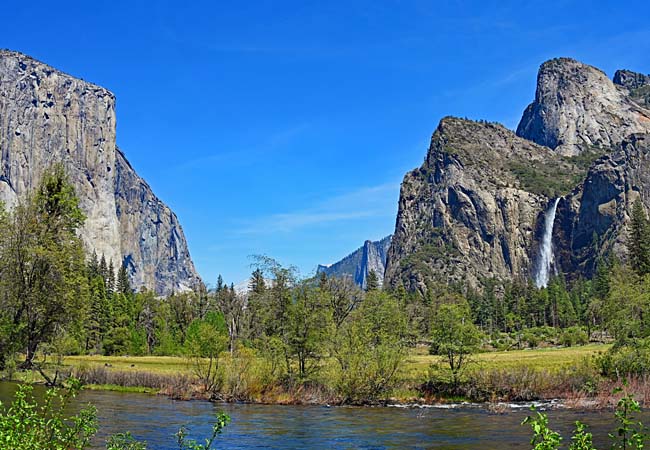
| Photos by Ben Prepelka Ben Prepelka Photography |
Yosemite National Park, one of the outstanding gems of the National Park Service, offers more variety than most other American parks. 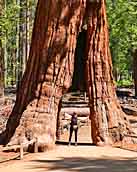 Inspirational sites contained in its 760,000 acres include some of the largest granite monoliths in the world, some of the tallest waterfalls, an alpine scenic byway, groves of giant sequoias, access to the backcountry of the High Sierras and one of the most majestic valleys ever seen. Its centerpiece, Yosemite (yo-SEH-muh-tee) Valley, has thrilled over 100 million visitors since John Muir explored the region in the late 1800s. Yosemite Valley stretches out for seven miles in the midst of California's highest Sierra Nevada Mountain Range where a half dozen streams tumble from the three to four thousand foot high granite cliffs. Here, one of the highest waterfalls in the world, Yosemite Falls combines three sections for a total drop of 2425 feet.
Inspirational sites contained in its 760,000 acres include some of the largest granite monoliths in the world, some of the tallest waterfalls, an alpine scenic byway, groves of giant sequoias, access to the backcountry of the High Sierras and one of the most majestic valleys ever seen. Its centerpiece, Yosemite (yo-SEH-muh-tee) Valley, has thrilled over 100 million visitors since John Muir explored the region in the late 1800s. Yosemite Valley stretches out for seven miles in the midst of California's highest Sierra Nevada Mountain Range where a half dozen streams tumble from the three to four thousand foot high granite cliffs. Here, one of the highest waterfalls in the world, Yosemite Falls combines three sections for a total drop of 2425 feet.
During the height of the Civil War in the country's East, Thomas Starr King and Frederick Law Olmsted convinced 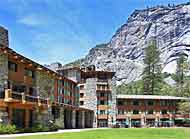 Senator John Conness of California to negotiate the preservation of Yosemite. These efforts lead President Lincoln to sign the preservation bill on June 30, 1864. Homesteading claims and a flood of tourists challenged park guardians for the next 40 years. But at this time only the Yosemite Valley and Mariposa Grove came under state park jurisdiction. After much lobbying, led by John Muir, Yosemite became a National Park in 1890 and Congress set aside 1500 square miles of public land.
Senator John Conness of California to negotiate the preservation of Yosemite. These efforts lead President Lincoln to sign the preservation bill on June 30, 1864. Homesteading claims and a flood of tourists challenged park guardians for the next 40 years. But at this time only the Yosemite Valley and Mariposa Grove came under state park jurisdiction. After much lobbying, led by John Muir, Yosemite became a National Park in 1890 and Congress set aside 1500 square miles of public land.
This main valley view was taken during the spring when the waterfalls are found putting on their best show. 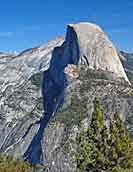 During late summer the waterfalls have lost their punch and are reduced to a trickle. Beyond the marvels of Bridalveil and Yosemite falls, Half Dome and El Capitan, nearly 1200 square miles of parkland lay outside the confines of Yosemite Valley. Five park entrances connect visitors with Hetch Hetchy, Big Oak Flat Road, Wawona Road, Tioga Road and, of course, Yosemite Valley.
During late summer the waterfalls have lost their punch and are reduced to a trickle. Beyond the marvels of Bridalveil and Yosemite falls, Half Dome and El Capitan, nearly 1200 square miles of parkland lay outside the confines of Yosemite Valley. Five park entrances connect visitors with Hetch Hetchy, Big Oak Flat Road, Wawona Road, Tioga Road and, of course, Yosemite Valley.
Aside from the magnificent sights in the valley, nature and park history are on display at park museums 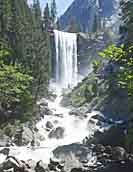 and nature centers. Ranging in elevations from 2000 to 13,000 feet, life zones harbor hundreds of animal species and over 1000 different plants and trees. Native Tribes of the 19th century, chased from the park during the Gold Rush years, are only recognized today in the names of places, such as Ahwahnee, Lehamite, Tenaya and Tuolumne.
and nature centers. Ranging in elevations from 2000 to 13,000 feet, life zones harbor hundreds of animal species and over 1000 different plants and trees. Native Tribes of the 19th century, chased from the park during the Gold Rush years, are only recognized today in the names of places, such as Ahwahnee, Lehamite, Tenaya and Tuolumne.
Most areas of the park are open all year, while the Tioga Road is closed by the first snowfall. Reducing valley congestion, free shuttle buses connect visitors with park lodges, day-use parking, campgrounds and the valley. Bus service (YARTS) also connects to the nearby cities of Merced, Fresno, Mammoth, Sonora and Lee Vining.
Park Maps

|
More Area Attractions |
|
Copyright © 2024 Benjamin Prepelka
All Rights Reserved
